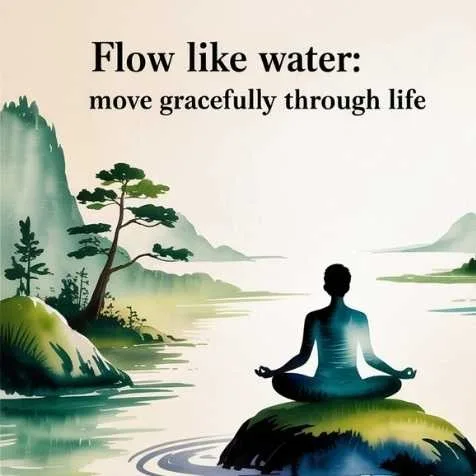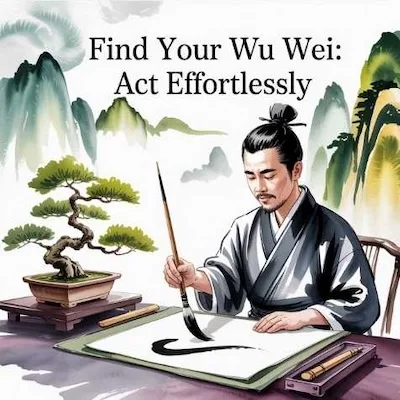In My previous post The Game of Life and How to Play It , we about about Florence Scovel Shinn’s classic book The Game of life and how to Play it has inspired countless people with practical wisdom for navigating life’s uncertainties. But centuries earlier, Chinese philosophers were already offering profound insights into how to live with greater ease, clarity, and harmony.
If you’ve ever felt that life is a puzzle missing a few key pieces, ancient Chinese philosophy may offer those missing links. These timeless teachings show us that life doesn’t have to be a constant battle—we can move through it with grace, rhythm, and deep inner strength.
Ready to explore some of the most powerful principles from Chinese thought and how they beautifully complement Shinn’s ideas? Grab your favorite beverage, get cozy, and discover how ancient wisdom can make your game of life easier, calmer, and more meaningful.
1. Flow Like Water: Move Gracefully Through Life
One of the most elegant and enduring lessons from Chinese philosophy is this: be like water. Laozi, the wise sage behind the Tao Te Ching, wrote:
“Nothing in the world is as soft and yielding as water. Yet for dissolving the hard and inflexible, nothing can surpass it.”

At first glance, water seems passive—soft, gentle, quiet. But in truth, water is one of the most powerful forces on earth. It shapes mountains, carves valleys, and finds its way through stone—not by force, but by flowing with persistence, patience, and grace.
In life’s game, many of us are taught to fight hard, push forward, hustle constantly. But Laozi offers a different strategy: don’t force—flow.
When something blocks your path, it doesn’t always mean you’re meant to crash through it. Sometimes, the wiser move is to pause, reassess, and move around the obstacle—preserving your energy and peace in the process.
Why This Matters in the Game of Life
In The Game of Life and How to Play It, Florence Scovel Shinn speaks about aligning with divine flow—trusting timing, surrendering struggle, and stepping into grace. This echoes the Daoist principle of wu wei—effortless action, or action in harmony with the moment.
Flowing like water means being flexible, not weak. It means knowing when to stand firm and when to bend. It means trusting your direction, even when the road ahead looks uncertain.
When you embody this, challenges lose their power to overwhelm you. You start to see detours not as setbacks—but as part of a greater redirection.
💡 Real-Life Reflection
Think of moments where forcing your way only led to stress, burnout, or disappointment. Now think of times when letting go—even briefly—revealed an easier, more natural path.
Maybe you didn’t get the job you wanted, but it led you to a better fit. Maybe a relationship ended, but in the stillness that followed, you found clarity or healing.
Water teaches us: the path is always there—we just have to soften enough to see it.
✨ Quick Practice
The next time you’re met with a challenge—an unexpected delay, a conflict, a closed door—pause and ask:
“How can I flow around this instead of fighting it?”
It may mean adjusting your approach, softening your tone, or even stepping back entirely. Trust that doing less doesn’t mean settling—it means moving with wisdom, not just willpower.
Over time, you’ll notice: life becomes smoother. Not because it’s easier, but because you’re more graceful in how you meet it.
2. ⚖️ Balance Your Yin and Yang: Finding Harmony in Life’s Contrasts
The ancient Chinese masters observed a truth that still holds in every corner of life: everything is made of opposites that rely on each other. This is the essence of Yin and Yang—a foundational principle in Chinese philosophy, medicine, and daily living.
If this idea feels new or abstract, here’s a simple way to understand it:

- Yin represents stillness, rest, the moon, the feminine, the intuitive, the quiet, the cool.
- Yang embodies movement, action, the sun, the masculine, the rational, the loud, the warm.
These are not “good” or “bad” qualities. One is not better than the other. In fact, true harmony comes not from picking sides—but from learning how to dance between them.
Think of breathing: inhale (Yin), exhale (Yang).
Work and rest. Silence and expression. Holding on and letting go.
You’ll find Yin and Yang in your own habits, emotions, and decisions. When one dominates too long, life feels out of sync. Too much Yang—constant doing, pushing, noise—and you burn out. Too much Yin—withdrawal, avoidance, stillness—and you may stagnate.
🌗 Why This Matters in the Game of Life
In The Game of Life and How to Play It, Florence Scovel Shinn emphasizes the power of faith, mental alignment, and taking inspired action. Chinese wisdom agrees—but adds a layer: knowing when to act (Yang) and when to wait (Yin) is an art. You win the game not just by pushing ahead, but by knowing when to pause, reflect, and receive.
Balance allows you to respond instead of react, to observe instead of chase, to restore instead of collapse.
💡 Real-Life Reflection
Ever hit a point where you’re overworking, exhausted, but too wired to rest? That’s a Yin-Yang imbalance. Or maybe you’ve been in a phase of avoidance—telling yourself you’re “waiting for the right time,” when deep down, fear is blocking your action. That’s also imbalance.
Learning to recognize these moments—and gently correct your course—is a lifelong skill. But once you start, it changes how you approach everything.
✨ Quick Practice
Today, notice where you lean:
- Are you in constant motion, struggling to slow down? (Too much Yang)
- Are you hesitating, avoiding decisions or conversations? (Too much Yin)
Ask yourself: What would restore balance right now? Maybe it’s a quiet walk. Maybe it’s finally making that call. Maybe it’s doing less—or doing one small, meaningful thing with full presence.
You don’t need to “fix” anything overnight. Balance isn’t a finish line—it’s something you return to, gently, again and again.
3. Find Your Wu Wei: Act Effortlessly
In the heart of Taoist philosophy lies a powerful and often misunderstood idea: Wu Wei (無為), commonly translated as “effortless action” or “non-doing.”

But Wu Wei doesn’t mean doing nothing. It’s not laziness or passivity. Instead, it’s about acting in complete harmony with the natural flow of life—so that what you do feels smooth, aligned, and almost… easy.
Think of moments when you were completely immersed in something you love. You lost track of time. You didn’t have to force focus or motivation. Your actions flowed seamlessly, and results seemed to unfold naturally. That’s Wu Wei.
When you live in Wu Wei, you’re not swimming upstream. You’re not grinding or controlling every detail. You’re engaged, aware, responsive—but without strain.
🌱 Why This Matters in the Game of Life
In The Game of Life and How to Play It, Florence Scovel Shinn emphasizes faith and alignment—that when you connect with your higher self, life becomes less about chasing and more about receiving. Wu Wei speaks to the same truth: stop chasing, start aligning.
We often confuse effort with effectiveness. But true power comes not from pushing harder, but from knowing when to act, and how to act, with ease.
When your actions reflect your nature—your values, your joy, your purpose—life stops feeling like a constant uphill battle. You move forward not because you force yourself to, but because it feels right.
💡 Real-Life Reflection
You’ve likely felt this before—perhaps while writing, painting, teaching, gardening, or speaking with someone who truly matters to you. In those moments, there’s no resistance. You’re not performing. You’re just being, and doing, all at once.
Now contrast that with times when you’ve tried to force something—a job you didn’t care about, a relationship built on pleasing rather than connection, a goal that looked good on paper but left you drained. That’s the opposite of Wu Wei.
One path opens doors with grace. The other slams them shut with burnout.
✨ Quick Practice
To bring more Wu Wei into your daily life, ask yourself:
What energizes me, even when it’s hard?
What activities feel natural, not forced?
Where in my life do I feel the most resistance—and why?
Then begin shifting your actions toward what feels effortlessly aligned. You don’t need to overhaul everything at once. Even one small shift—saying no to what drains you and yes to what lights you up—can re-align your entire direction.
Follow what genuinely excites and inspires you. That’s your inner compass guiding you toward Wu Wei—where effort fades, and ease takes its place.
Final Section – Conclusion & Resources
📚 Want to Go Deeper?
To truly master The Game of Life and How to Play It, it helps to reflect, explore, and revisit these ideas often. Here are some resources to continue your journey:
- 📘 The Game of Life How to Play It by Florence Scovel Shinn (Amazon) – A foundational book in metaphysical self-help. Learn how words, thoughts, and inner alignment shape your reality.
- 📗 Tao Te Ching by Laozi – English Translation (Amazon) – A poetic guide to living in flow, full of gentle but transformative insights from ancient China.
Note: As an Amazon Associate, I earn from qualifying purchases at no extra cost to you. Thank you for supporting this blog.
Your Turn – How Will You Play?
These teachings aren’t meant to be studied once and forgotten. They’re meant to be lived—gently, patiently, moment by moment.
So pause for just a second and ask yourself:
- Am I flowing or forcing?
- Do I need more stillness—or more movement?
- Where can I act with less effort, but more intention?
You don’t need to get it perfect. You just need to begin noticing.
Because once you learn how to play life’s game with the grace of water, the balance of Yin and Yang, and the quiet strength of Wu Wei—you won’t just move through life. You’ll glide through it.
Want to review the post again, or prefer to watch instead of read? Here’s the video version of The Game of Life and How to Play It -Through the Lens of Ancient Chinese Wisdom





[…] The Game of Life and How to Play it […]